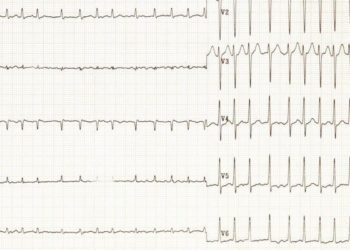Arterial catheter monitoring in ICU not associated with mortality benefit
1. In this retrospective cohort study, the use of arterial catheters in 139 US ICUs was not associated with mortality in medical patients requiring mechanical ventilation.
2. Patients with an arterial catheter did not have an increased rate of low-volume packed red blood cell transfusions, but did have a greater number of days requiring vasopressors, a longer duration on mechanical ventilation and a longer length of stay in the ICU.
Evidence Rating Level: 2 (Good)
Study Rundown: Diagnostic monitoring interventions such as arterial catheters (AC) are often used in acute care settings. However the evidence for their use is unclear. While AC’s are used to facilitate phlebotomy, collect arterial blood gases, and monitor hemodynamic status, there are many downsides. Risks of arterial catheters include limb ischemia and infection, and the cost for insertion and maintenance must be considered. Currently, there is paucity of data detailing the impact of ACs on clinical outcomes in critically ill patients. This study sought to examine the relationship between AC use and hospital mortality in ICU medical patients.
The investigators did not find a significant association between AC use and hospital mortality within their primary cohort of medical patients requiring mechanical ventilation. There was also no association between hospital mortality and AC use. In patients that required a vasopressor during their ICU stay, the odds of hospital mortality were minimally increased in patients who had an AC. There was an increase in number of days requiring vasopressors, duration of mechanical ventilation and ICU length of stay for patients who received ACs. There was no association between low-volume packed red blood cell (pRBC) transfusions and AC use. Strengths of the study include it being a large-scale retrospective cohort study, and the use of propensity matching in attempts to simulate a randomized trial. Despite this attempt, the study is still an observational one, and it is not possible to establish causation.
Click to read the study, published today in JAMA Internal Medicine
Relevant Reading: The increasing burden of phlebotomy in the development of anaemia and need for blood transfusion amongst trauma patients
In-Depth [retrospective cohort]: This study investigated all adult ICU admissions of US hospitals participating in Project IMPACT from 2001 to 2008. Project IMPACT is a paid service to which hospitals can subscribe to in order to receive regular performance audits and feedback. The primary cohort included medical patients requiring mechanical ventilation. Nine secondary cohorts were examined for generalizability, which included patients requiring vasopressors. The primary outcome analyzed was hospital mortality. Secondary outcomes included days requiring vasopressors, days of mechanical ventilation and ICU length of stay. Additionally, rate of low-volume (<2 units) pRBC transfusions were analyzed to evaluate potential morbidity of AC use as a result of increased phlebotomy.
The analysis included 13,603 propensity-matched pairs of patients who did have an AC and those who did not have an AC. Patients in the AC group were slightly older and also were more likely to be on Medicare. No association was found between AC use and hospital mortality (OR 0.98, 95% CI 0.93-1.03). The results remained robust through all alternative statistical and sensitivity analyses. In patients using vasopressors, the odds of mortality were slightly increased in patients with an AC (OR 1.08, 95% CI 1.02-1.14, p=0.008). There was also no association between pRBC transfusions and AC used (rate ratio 0.99, 95% CI 0.82-1.19, p=0.91).
More from this author: Overall US diet quality improved from 1999 to 2010
Image: PD
©2012-2014 2minutemedicine.com. All rights reserved. No works may be reproduced without expressed written consent from 2minutemedicine.com. Disclaimer: We present factual information directly from peer reviewed medical journals. No post should be construed as medical advice and is not intended as such by the authors, editors, staff or by 2minutemedicine.com. PLEASE SEE A HEALTHCARE PROVIDER IN YOUR AREA IF YOU SEEK MEDICAL ADVICE OF ANY SORT.







